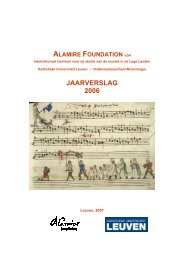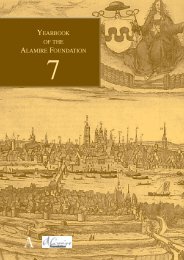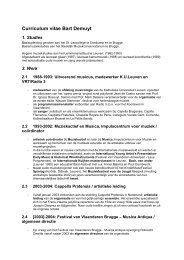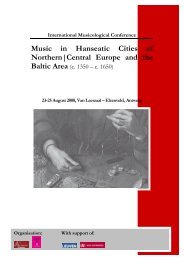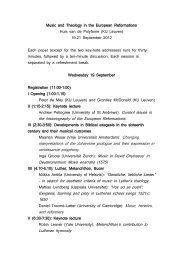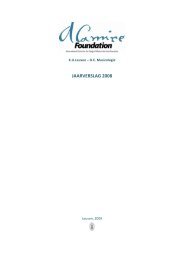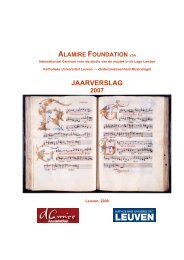YEARBOOK OF THE ALAMIRE FOUNDATION
YEARBOOK OF THE ALAMIRE FOUNDATION
YEARBOOK OF THE ALAMIRE FOUNDATION
Create successful ePaper yourself
Turn your PDF publications into a flip-book with our unique Google optimized e-Paper software.
236 SUSAN LEWIS HAMMOND<br />
Harmonia celeste are somewhat more revealing. The dedicatory addresses of these<br />
two anthologies are paired with dedicatory music: madrigals that glorify patrons, thus<br />
offering an aural, musical counterpart to the penned prefaces they follow. Anthologies<br />
were particularly well suited to provide the combination of a flattering dedication<br />
and musical selections that reflected well on a patron. Phalèse follows his dedication<br />
of Musica divina with the four-voice madrigal Fra l’altre virtu, also dedicated to<br />
Bartolomei. Together, the dedication and dedicatory madrigal form a double-opening<br />
(folios 1v–2r). Though the madrigal is unattributed in the 1583 edition of Musica<br />
divina, the headline in the 1588 edition names Peuernage as the composer. This link<br />
between Bartolomei and Pevernage suggests the composer may have served as the<br />
point of contact between the dedicatee and the compiler/printer, Pierre Phalèse.<br />
This hypothesis is supported by the fact that later in 1583 Pevernage himself compiled<br />
the next anthology in the series, Harmonia celeste. He dedicated the volume to<br />
the Milanese merchant Cesare Homodei, who was active in Antwerp prior to becoming<br />
a citizen of Cologne on 19 August 1585. 26 Two madrigals by Pevernage, Qvando la<br />
voce al dolce canto and Con humilatto sta fatica mia, follow the dedication. They<br />
each bear the headline Al Molto Magnifico S.[ignore] Cesare Homodei. A final dedicatory<br />
madrigal, Cesar gentil degno da loro (also by Pevernage), opens the six-voice<br />
settings on folio 23 verso with praise of Homodei’s love of music.<br />
The strongest link between compiler and dedicatee is found in Symphonia<br />
angelica, addressed to the senator and treasurer of Antwerp, Cornelius Pruenen. 27 As<br />
a northerner of high social standing, Pruenen was a model dedicatee with well-honed<br />
musical skills, tastes, and spending habits. 28 Pruenen had supported several local musicians,<br />
including Waelrant, and in 1582 purchased madrigal books from the Plantin<br />
shop. 29 In fact, Waelrant’s dedication of Symphonia angelica honours an association<br />
26 H. STEHKÄMPER, Kölner Neubürger 1356–1798. Erster Teil: Neubürger 1356–1640, (Mitteilungen<br />
aus dem Stadtarchiv von Köln, 61), Cologne, 1975, p. 156, cited in K. DERDE and S. WILLAERT,<br />
Andreas Pevernage, p. 174, n. 61. Despite the move, Homodei remained a significant patron of Antwerp<br />
music books: Jean de Castro’s Madrigali... con doi canzoni (Antwerp, Phalèse & Bellère, 1588) also<br />
bears a dedication to him.<br />
27 For biographical information on Pruenen, see I. GHIJS, art. Pruynen, Cornelis, in Nationaal Biografisch<br />
Woordenboek, 13 (1990), columns 670–672.<br />
28 On the musical literacy of Antwerp audiences, see HOEKSTRA, The Reception and Cultivation of the<br />
Italian Madrigal, pp. 147, 152–156. On the education of Antwerp citizens in general, see G. MARNEF,<br />
Antwerp in the Age of Reformation: Underground Protestantism in a Commercial Metropolis,<br />
1550–1577, Baltimore, 1996, pp. 33–37; and J. MURRAY, A smackering of... Grammar, in Antwerp<br />
in the Age of Plantin and Brueghel, Norman, Oklahoma, pp. 96–113.<br />
29 A payment to Huybrecht Walravens sanger dates from 1567 (Stadsarchief Antwerpen, Vierschaar 330,<br />
Processtukken Pieter Matheuss: Van Dyck tegen de Stad Antwerpen, quoted in PERSOONS, De Genealogie<br />
van de Antwerpse Toonkundige Hubertus Waelrant [1517–1595], pp. 153–154). An entry in Plantin’s<br />
Grand livre 1582–1589 (7 June 1582) confirms that Pruenen acquired the Secondo libro di Regnard<br />
and Madrigali di prenestim from the Officina Plantiniana (Antwerp, Museum Plantin-Moretus, Grand<br />
livre 1582–1589, Arch. 20, fol. 50).



